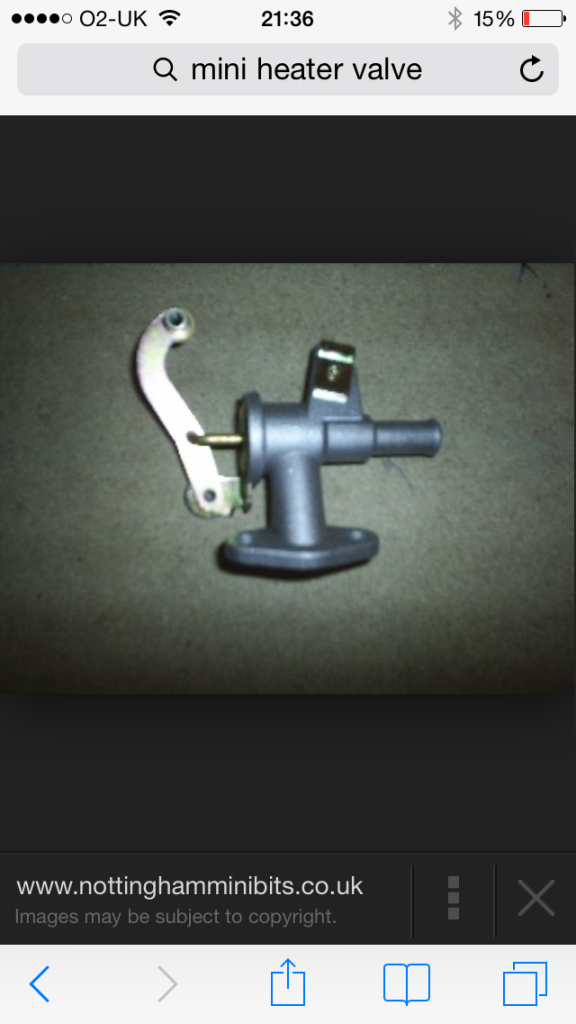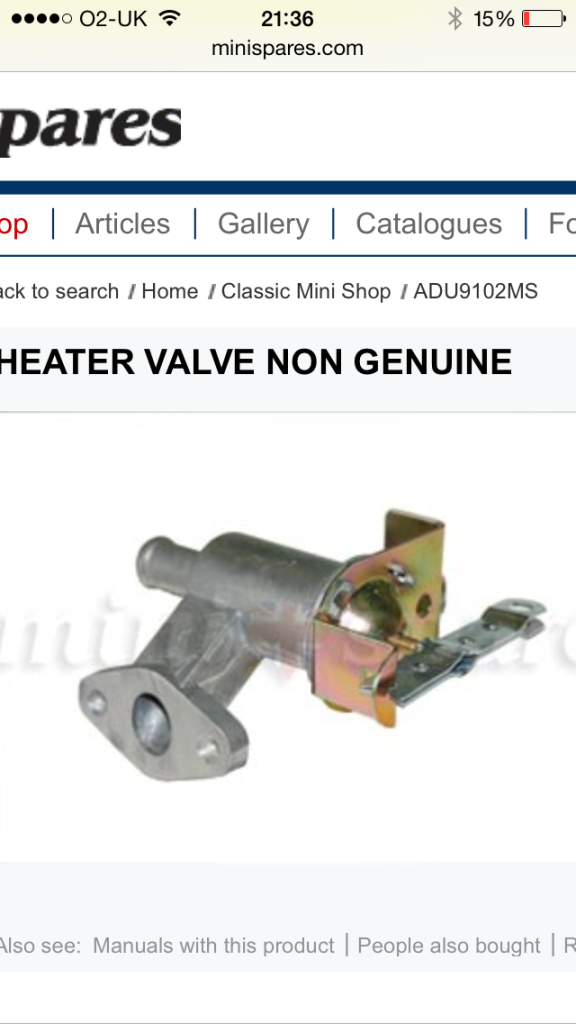How hot does your 1275 s run?
- YMJ
- 1275 Cooper S
- Posts: 1025
- Joined: Thu Jun 24, 2010 2:31 pm
- Location: Beyond the Sun
Re: How hot does your 1275 s run?
Where can you get those little stickers from? I think I may give them a try.
Re: How hot does your 1275 s run?
You both need to think about what happens to the water, as it boils in the head and how a higher boiling point effects this.Spider wrote:dklawson is spot on here. If everything is right with the engine and cooling system, you can run without a cap (ie, non-pressurised).Smiffy wrote:Shows what you know then doesn't it.dklawson wrote:Raising the radiator cap pressure will raise the boiling point temperature but it will not lower then engine temperature.
- Spider
- 1275 Cooper S
- Posts: 4860
- Joined: Mon May 07, 2012 6:10 am
- Location: Big Red, Australia
- Has thanked: 204 times
- Been thanked: 78 times
Re: How hot does your 1275 s run?
I think we have a handle on that, however, maybe you could explain this since we 'don't know';-Smiffy wrote:
You both need to think about what happens to the water, as it boils in the head and how a higher boiling point effects this.
Smiffy wrote:Shows what you know then doesn't it.dklawson wrote:Raising the radiator cap pressure will raise the boiling point temperature but it will not lower then engine temperature.
Re: How hot does your 1275 s run?
Obviously not as you have a handle on it, but I'll give you a clue. Think about the little bubblesSpider wrote:I think we have a handle on that, however, maybe you could explain this since we 'don't know';-Smiffy wrote:
You both need to think about what happens to the water, as it boils in the head and how a higher boiling point effects this.
- dklawson
- 1275 Cooper S
- Posts: 1166
- Joined: Tue Feb 18, 2014 4:44 am
- Location: Durham, NC USA
- Been thanked: 1 time
- Contact:
Re: How hot does your 1275 s run?
I apologize to the OP as I know this post is a diversion from your thread’s intended topic.Smiffy wrote:Shows what you know then doesn't it.dklawson wrote:Raising the radiator cap pressure will raise the boiling point temperature but it will not lower then engine temperature.
Smiffy, I assume from the tone and text in your reply to my post that I have offended you and that you disagree with my statement about radiator caps. I apologize for the brevity of my last post but I stand behind my statement that the job of the radiator cap is to raise the boiling point of the coolant, not to lower operating temperatures.
In your subsequent posts you appear to be suggesting that microboiling or cavitation is responsible for higher coolant temperatures and that by increasing the radiator cap pressure it is possible to lower operating temperatures. It is true that the higher the system pressure the more microboiling/cavitation you can suppress. However, installing a high pressure cap does not automatically mean the system is operating at that cap's pressure rating. The system pressure is a function of coolant temperature and the cap is basically a release valve that opens at a specified pressure (the pressure at boil over). If the cooling system is not experiencing boil over, the system is operating below the pressure rating of the radiator cap.
For each PSI increment in rating the cap raises the boiling point of a 50/50 water/antifreeze mix by about 3 degrees F. Three common cap ratings are 7, 13, and 15 PSI and these are typically referenced as offering boil-over protection to 221, 251, and 257 degrees F respectively. The OP is reporting temperatures closer to 200 degrees F and has not reported boil over so his engine’s cooling system has not even reached 7 PSI. Thus, a higher pressure cap will not change any of the behavior that is being seen.
Rather than us arguing about these points further in this thread, please see the link below to Absolute Radiator’s web site. The page discusses how the radiator cap works and what it can and cannot do.
http://www.absoluteradiator.com/Radcap.htm
If you want to discuss this further, please send me a PM off list so the OP’s thread can run its course.
Doug L.
-
dgear1984
- 850 Super
- Posts: 187
- Joined: Mon Aug 19, 2013 10:19 pm
Re: How hot does your 1275 s run?
Not quite where I got these from but most race/rally prep companies should sell them. You can get them in all different temp ranges. Obviously these are single use. These are similar but largerYMJ wrote:Where can you get those little stickers from? I think I may give them a try.
http://www.demon-tweeks.co.uk/karting/p ... indicators
-
dgear1984
- 850 Super
- Posts: 187
- Joined: Mon Aug 19, 2013 10:19 pm
Re: How hot does your 1275 s run?
Dad has borrowed a thermocouple to put in the water pipe so I can re check the gauge. Next time I get a day off, Ill try that and get to the bottom of this
Maybe a capillary one would be a nice addition.
Maybe a capillary one would be a nice addition.
-
Old English White
- 1275 Cooper S
- Posts: 2646
- Joined: Wed Oct 19, 2011 5:07 pm
- Location: Southern England
- Been thanked: 9 times
Re: How hot does your 1275 s run?
Must admit that when I had overheating concerns with my own 1275S I bought a Smiths capillary type temp gauge which gave a MUCH more accurate reading than the original electrical one. I also changed the radiator pressure cap to a 7lb one which seemed to work perfectly well for me. Like you, my engine, radiator etc etc had all been rebuilt and were known to be free from blockages etc.....
-
dgear1984
- 850 Super
- Posts: 187
- Joined: Mon Aug 19, 2013 10:19 pm
Re: How hot does your 1275 s run?
Managed to put the thermocouple in the top hose today. Turns out the gauge is reading very differently to the thermocouple. I know which one I trust.
Looks like now the engine was running much cooler than I first thought, luckily.
I think I'll put a capillary one on it just for piece of mind so I can keep a close eye on it, especially in traffic on hot days.
Annoyingly the heater valve started or leak while I was checking the gauge in the driveway. #*#%8!g thing, so I never got to take it out on the road with the thermocouple in. Only small drips but didn't want to risk it blowing and needing to get towed home.
I see you can get two types of heater valve. Which would be more correct for a 1967 mk1. I realise it needs to be angled. I think the later is closer to factory spec...

photobucket.com/user/lot977f/media/7C6E4457-FC9F-4EC0-9571-CDCBFF25A97D_zpsq0otss8s.png.html] [/URL]
[/URL]
Thanks Dave
Looks like now the engine was running much cooler than I first thought, luckily.
I think I'll put a capillary one on it just for piece of mind so I can keep a close eye on it, especially in traffic on hot days.
Annoyingly the heater valve started or leak while I was checking the gauge in the driveway. #*#%8!g thing, so I never got to take it out on the road with the thermocouple in. Only small drips but didn't want to risk it blowing and needing to get towed home.
I see you can get two types of heater valve. Which would be more correct for a 1967 mk1. I realise it needs to be angled. I think the later is closer to factory spec...

photobucket.com/user/lot977f/media/7C6E4457-FC9F-4EC0-9571-CDCBFF25A97D_zpsq0otss8s.png.html]
 [/URL]
[/URL]Thanks Dave